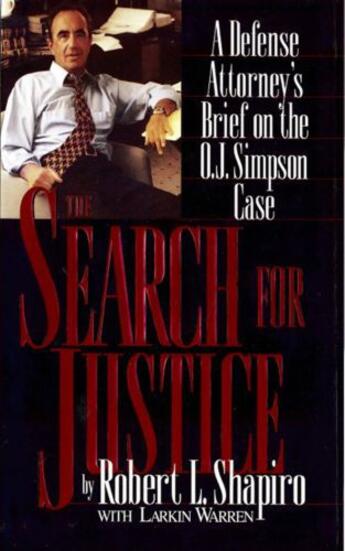Résumé:
From June 13, 1994, to October 3, 1995, Robert Shapiro stood in the middle of a drama that held millions of Americans in thrall. Now for the first time, the architect of the defense strategy tells the inside story of the O.J. Simpson trial from the beginning. In this book, the man who assembled... Voir plus
From June 13, 1994, to October 3, 1995, Robert Shapiro stood in the middle of a drama that held millions of Americans in thrall. Now for the first time, the architect of the defense strategy tells the inside story of the O.J. Simpson trial from the beginning. In this book, the man who assembled the "dream team" answers the questions of fact, law, and ethics that were fired at him before and after the jury's verdict. With candor, wit, and compassion, Shapiro brings to light the details of what has been called "the trial of the century," giving us revealing glimpses of the defendant and the others whose names became so familiar: Johnnie Cochran, F. Lee Bailey, Marcia Clark, Barry Scheck, Chris Darden, and Judge Lance Ito." "At the heart of the book is the dramatic story of how Shapiro planned the defense strategy against what appeared to be overwhelming odds. Within minutes of his first meeting with O.J., he started "thinking like the prosecution," lining up a powerful arsenal of lawyers, investigators, and expert witnesses to counter what the prosecution claimed was an open-and-shut case. In the midst of mounting the legal defense, Shapiro also had to deal with the tumult of a media circus, a fractious defense team, and his own priorities as a husband and father. Through it all, he maintained a steady hand and the quiet belief that justice would prevail. Confronting the prosecution's "mountain of evidence," Shapiro and his defense team uncovered the elements of reasonable doubt in the faulty handling of blood samples and other mistakes made by the police as they rushed to erroneous conclusions." "Robert Shapiro's reasoned and principled arguments about the Bill of Rights and the role and duty of a defense attorney will deepen our understanding of the verdict, the trial, and the place this story occupied in the American culture. Answering critics who charge that "loopholes" and legal tactics prevailed over justice, Shapiro convincingly demonstrates that the only possible verdict - even without the race card Johnnie Cochran flung on the table - was the conclusion of "reasonable doubt" reached by the jury.














